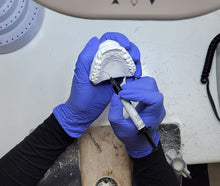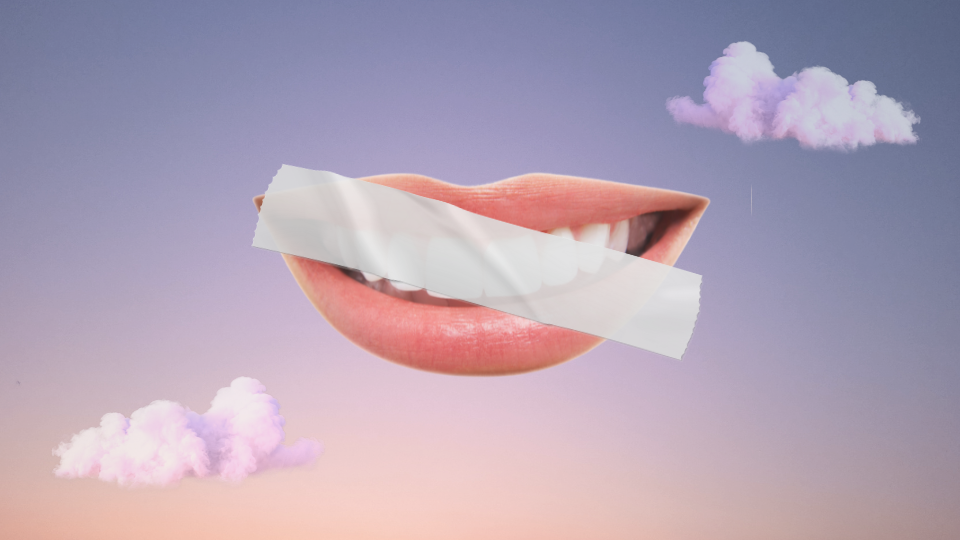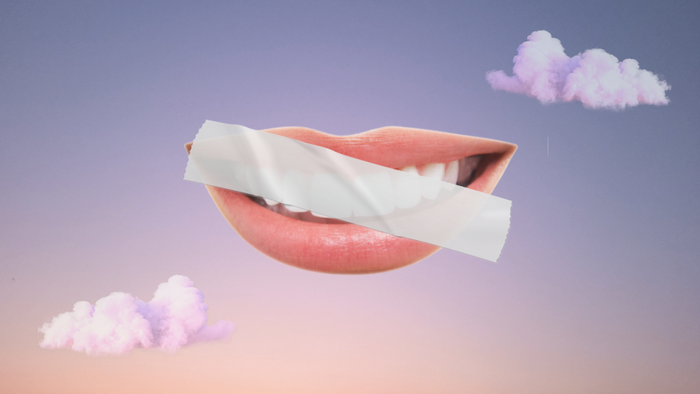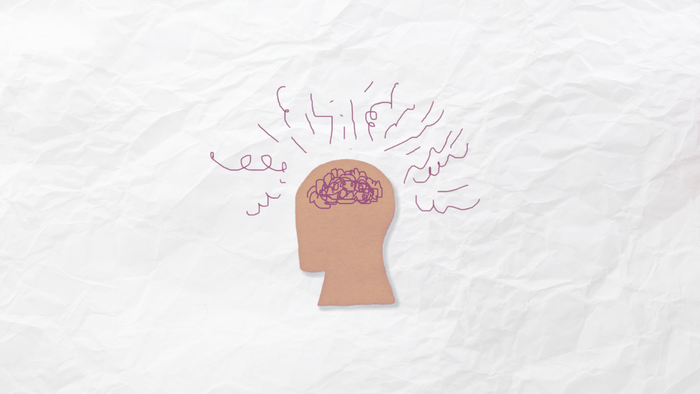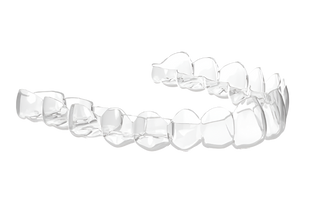Mouth taping has steadily grown from a niche trend to a better known practice whose goal is to encourage nasal breathing and a host of other health benefits. While it has grown in popularity, many people still have a lot of questions about it like: What is mouth taping? What is mouth tape used for? Does mouth tape work, and is it actually safe? In this article, we’ll explore the benefits of mouth taping, what current research and professionals say about its effectiveness, and whether it could be right for you.
What is mouth taping?
As the name suggests, mouth taping is when you tape your mouth closed using a skin-safe tape. This encourages you to breathe through your nose instead of your mouth while you sleep. Mouth taping has gained popularity for its purported improvement of snoring, oral hygiene, and sleep quality. Some people also anecdotally find that mouth taping helps to reduce their teeth grinding. In this article, we’ll discuss how mouth taping works, potential benefits, side effects, and how you can safely try this viral trend at home.
How does mouth taping work?
The main way mouth taping works to enact all of its different potential benefits is by encouraging nasal breathing and preventing mouth breathing. Nasal breathing offers significant health advantages compared with mouth breathing. Chronic mouth breathing can contribute to a range of issues including dry mouth, increased risk of tooth decay, lower oxygen exchange efficiency, poor sleep quality, and daytime fatigue.
What are the potential benefits of mouth taping?
The benefits of mouth taping are largely linked to nasal breathing which has known benefits when compared to mouth breathing. Some key benefits of nasal breathing include:
-
Natural Filtration: The nose acts as a built-in air filter. Tiny hairs and mucus in the nasal passages trap dust, allergens, and pathogens before they enter your lungs which is something mouth breathing cannot do.
-
Humidification and Temperature Control: Nasal breathing warms and humidifies the air you inhale, reducing irritation in your throat and lungs. Mouth breathing often leads to dryness and inflammation.
-
Improved Oxygen Uptake: Breathing through your nose stimulates the production of nitric oxide, a gas that helps widen blood vessels and improve oxygen circulation throughout your body.
-
Better Sleep Quality: Studies have shown that nasal breathing can reduce snoring, sleep disturbances, and even mild obstructive sleep apnea which leads to deeper, more restorative sleep.
-
Oral Health Protection: Mouth breathing during sleep can dry out your mouth, increase bacteria buildup, and contribute to bad breath, cavities, and gum disease. Nasal breathing helps maintain saliva flow, which protects teeth and gums.
The benefits of mouth taping are largely anecdotally reported as of now. Advocates of mouth taping often report improvements including:
-
Reduced snoring and fewer sleep interruptions
-
Less dry mouth, bad breath, and improved oral health, because nasal breathing keeps saliva flowing and avoids dehydrating the mouth.
-
Improved allergies
-
Potential cardiovascular support, including improved blood flow and reduce blood pressure (though these effects are not yet clinically proven in studies).
-
Decrease in teeth grinding
It's important to keep in mind that because of its relative newness as a health practice, mouth taping is still more in the realm of alternative treatment methods rather than an established practice recommended by physicians and other health professionals.
Does mouth tape work?
While there isn’t a lot of scientific evidence to support if mouth taping works, a few small studies have found some promising results for mouth taping in addition to anecdotal evidence that mouth taping can be used to prevent snoring, reduce allergies, and eliminate bad breath..
An initial 2022 study on mouth taping showed that using a skin-safe tape before bedtime did result in significantly less snoring for those diagnosed with obstructive sleep apnea, a condition that is characterized by snoring. A few small studies have also researched the impact of mouth taping on sleep apnea and found that mouth taping decreased the apnea-hypopnea index (a measure of sleep apnea severity).
Mouth taping may also be used to reduce allergies and eliminate bad breath by filtering allergens and enabling saliva flow, two acts that are often obstructed with mouth breathing, though evidence of this is largely anecdotal.
Similarly, while there haven't been studies on mouth taping and teeth grinding, teeth grinders have anecdotally found that it can help.
What are the potential risks of mouth taping?
While mouth taping has its potential perks, experts caution about risks:
-
Breathing difficulties, especially if nasal passages are blocked or if you have conditions like sleep apnea or allergies
-
Skin irritation or allergic reactions from adhesive tape
-
Discomfort, anxiety, or disrupted sleep, particularly for those with claustrophobia or nasal congestion
Professional recommendations include consulting a healthcare provider before trying mouth taping, especially for individuals with respiratory or nasal issues
Does mouth taping help with teeth grinding?
There are no well-established, peer-reviewed scientific studies that directly link mouth taping to reduced teeth grinding (bruxism) as of now.
However, here’s what we do know from adjacent research:
1. Mouth Taping and Nasal Breathing
Some small studies have evaluated mouth taping’s impact on sleep-disordered breathing (e.g., snoring or mild obstructive sleep apnea), and they generally support the idea that taping can encourage nasal breathing:
-
A 2022 randomized trial in patients with mild OSA found that mouth taping led to a significant reduction in the apnea-hypopnea index (AHI) by promoting nasal breathing during sleep (Huang & Tsai, 2022).
-
Another small pilot study found that mouth taping helped reduce snoring in mouth-breathing individuals with mild OSA (Kudo et al., 2019).
These studies suggest that mouth taping may improve breathing patterns, which could indirectly reduce factors that contribute to bruxism, such as poor sleep quality or airway restriction, but this has not been directly proven.
2. Bruxism Is Multifactorial
Teeth grinding during sleep (sleep bruxism) is considered a multifactorial condition, linked to:
-
Sleep arousals and micro-awakenings
-
Airway obstruction or sleep apnea
-
Stress and anxiety
-
Occlusal (bite) imbalance
There is growing interest in how airway resistance and sleep-disordered breathing contribute to bruxism. If mouth breathing contributes to airway resistance, nasal breathing might reduce grinding in some cases, but that remains speculative without direct studies.
3. No Direct Studies on Mouth Tape and Bruxism
To date:
-
There are no clinical trials or observational studies specifically evaluating whether mouth tape reduces bruxism frequency or intensity.
-
There is no consensus or clinical recommendation suggesting mouth taping as a treatment for teeth grinding.
Expert Perspective
While mouth taping may improve sleep quality and promote nasal breathing, it should not be relied upon as a treatment for teeth grinding—especially since grinding can result in cracked teeth, TMJ disorders, and enamel erosion.
A custom night guard, like the ones we offer at Chomper Labs, remains the gold standard for protecting your teeth from bruxism damage. In some cases, using a night guard in conjunction with strategies to promote nasal breathing (such as mouth taping under supervision) might offer added benefit, but consult your dentist or sleep specialist first.
The Hybrid Night Guard
$179
|
The Hard Night Guard
$179
|
The Soft Night Guard
$159
|
|
|---|---|---|---|
| Ideal for |
Moderate to heavy grinding
|
Heavy to severe grinding
|
Light grinding or moderate clenching
|
| material |
Soft inside / hard outside
|
Hard and rigid
|
Soft and flexible
|
| thickness |
3mm
|
2mm
|
3mm
|
| description |
The unique dual layer construction combines a soft interior layer for comfort and a hard exterior layer for durability. The best of both worlds.
|
The strong copolyester material is our most durable and is excellent as a highly protective barrier to combat heavy grinding and clenching.
|
The soft's rubber-like material is a perfect cushion against clenching forces and light grinding and also great at easing jaw muscle pain.
|
| Learn more | Learn more | Learn more |
How can I try mouth taping?
If you’re intrigued by the idea of mouth taping and want to try it yourself, be sure to first consult a healthcare or medical professional.
Next, it is crucial to use tape made specifically for mouth taping. These tapes are porous and are designed to be used while sleeping. You can also opt for mouth tape options that are hypoallergenic, commonly found at pharmacies.
There are no official guidelines for how to safely mouth tape, but it might be a good idea to try the tape on during the day, while you’re awake. This way, you can determine whether you have any difficulty breathing or suffer from any irritation with the tape.
Is mouth taping right for me?
Clinicians recommend seeing a sleep specialist or doctor if you suspect you suffer from a sleep disorder before you reach for the mouth tape. If you find yourself having difficulty breathing through your nose, you should not try mouth taping. These breathing issues could be caused by a variety of factors, including a deviated septum, allergies, or chronic congestion. It is crucial to determine the cause of your sleep or breathing-related issues prior to trying home remedies.
We’ll continue to keep you up to date on the latest oral health trends
Whether you suffer from teeth grinding or bad breath, we are committed to keeping you in the loop. Stay tuned to the Word of Mouth as we keep you informed on all the latest treatments, remedies, and viral trends related to oral health!

